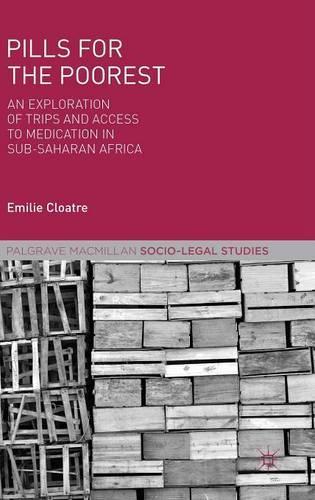
Pills for the Poorest: An Exploration of TRIPS and Access to Medication in Sub-Saharan Africa
(Hardback)
Publishing Details
Pills for the Poorest: An Exploration of TRIPS and Access to Medication in Sub-Saharan Africa
By (Author) E. Cloatre
Palgrave Macmillan
Palgrave Macmillan
6th August 2013
United Kingdom
Classifications
Tertiary Education
Non Fiction
Law and society, sociology of law
Society and culture: general
Medical sociology
Anthropology
Human biology
346.048
Winner of SLSA-Hart Socio-Legal Book Prize 2014
Physical Properties
Hardback
204
Width 155mm, Height 235mm
488g
Description
The desperate need for a vast part of the global population to access better medicines in more certain ways is one of the biggest concerns of the modern era.
Pills for the Poorest offers a new perspective on the much-debated issue of the links between intellectual property and access to medication. Using ethnographic case studies in Djibouti and Ghana, and insights from actor-network theory, it explores the ways in which TRIPs and pharmaceutical patents are translated in the daily practices of those who purchase, distribute, and use (or fail to use) medicines in sub-Saharan Africa. It suggests that focusing on routine practices and the material deployment of intellectual property significantly enriches our understanding of the complex dynamics that animate the field of access to medicines and helps relocate the role of law within those processes. It demonstrates how intellectual property affects access to medicines in ways that are often discreet, indirect and forgotten. By exploring these complex mechanisms, it seeks to ask questions about the modes of actions of pharmaceutical patents, but also, more generally, about the complexity of legal objects.
Reviews
'Cloatre's book is an insightful and valuable addition to not just socio-legal studies, but also the broader literature on pharmaceuticals and the social implications of global trade. Pills for the Poorest demonstrates why and how methodological innovation beyond traditional and even socio-legal ways of thinking about law remains essential. Such innovation can help to reveal blindspots in our understanding of law's production by and within, and interaction with, the social and political, and in doing so it serves to highlight that law is neither determinate nor reducible to those or indeed other things, but is rather part of a complex web.' - Mark Flear, School of Law, Queen's University Belfast 'Although the book is slim, its contribution is weighty, timely, and convincing.' - Socio Legal Studies, December 2014 In an area...with such extensive literature, it is refreshing to find a different approach taken to understanding the problem and its processes. An approach which has not been selected merely for its novelty, but applied in a meaningful and justified way, with its appropriateness clearly outlined in the book's introduction.' - Journal of Law and Society, November 2014 'Pills for the Poorest is a fascinating book.' - New Genetics and Society, July 2014 "As a text itself, the book has potential to reshape the thinking of readers from a wide range of fields, from law, science studies, healthcare policy, and beyond." - Review by Laura Stark of the New Books Network
Author Bio
Emilie Cloatre is a Senior Lecturer at Kent Law School, University of Kent, UK.
